小学一般现在时讲解及练习题
- 格式:doc
- 大小:54.00 KB
- 文档页数:5
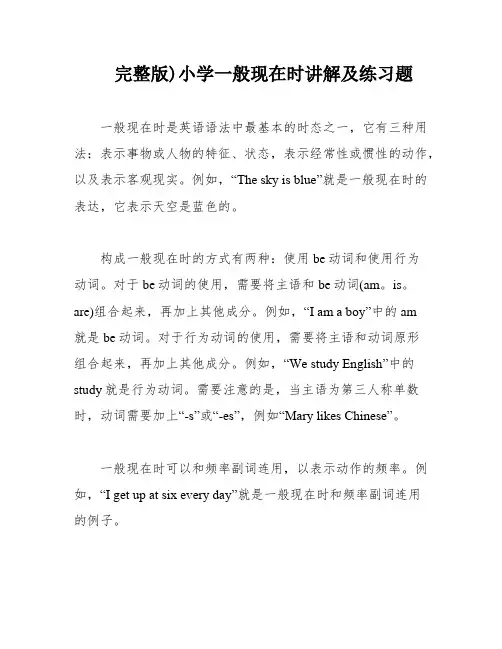
完整版)小学一般现在时讲解及练习题一般现在时是英语语法中最基本的时态之一,它有三种用法:表示事物或人物的特征、状态,表示经常性或惯性的动作,以及表示客观现实。
例如,“The sky is blue”就是一般现在时的表达,它表示天空是蓝色的。
构成一般现在时的方式有两种:使用be动词和使用行为动词。
对于be动词的使用,需要将主语和be动词(am。
is。
are)组合起来,再加上其他成分。
例如,“I am a boy”中的am就是be动词。
对于行为动词的使用,需要将主语和动词原形组合起来,再加上其他成分。
例如,“We study English”中的study就是行为动词。
需要注意的是,当主语为第三人称单数时,动词需要加上“-s”或“-es”,例如“Mary likes Chinese”。
一般现在时可以和频率副词连用,以表示动作的频率。
例如,“I get up at six every day”就是一般现在时和频率副词连用的例子。
一般现在时还可以用于构成否定句、一般疑问句和特殊疑问句。
对于be动词的否定句,需要在be动词后面加上not。
例如,“He is not a worker”就是be动词的否定句。
对于行为动词的否定句,需要在主语和动词原形之间加上don't或doesn't。
例如,“I don't like bread”和“He doesn't often play”就是行为动词的否定句。
对于一般疑问句,需要将be动词或do/does放在主语前面。
例如,“Are you a student?”就是一般疑问句。
对于特殊疑问句,需要在疑问词后面加上一般疑问句。
例如,“Where is my bike?”就是特殊疑问句。
需要注意的是,当主语为第三人称单数时,否定句和一般疑问句需要用doesn't,而不是don't或do。
例如,“He doesn't often play”和“Does she go to work by bike?”就是主语为第三人称单数时的否定句和一般疑问句。
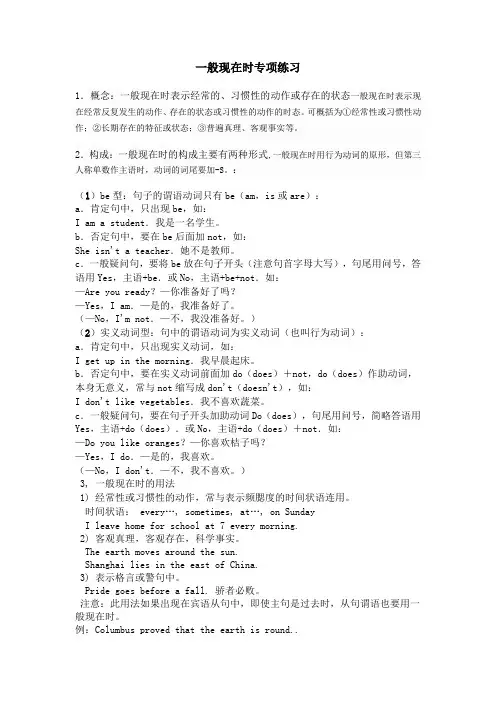
一般现在时专项练习1.概念:一般现在时表示经常的、习惯性的动作或存在的状态一般现在时表示现在经常反复发生的动作、存在的状态或习惯性的动作的时态。
可概括为①经常性或习惯性动作;②长期存在的特征或状态;③普遍真理、客观事实等。
2.构成:一般现在时的构成主要有两种形式,一般现在时用行为动词的原形,但第三人称单数作主语时,动词的词尾要加-S。
:(1)be型:句子的谓语动词只有be(am,is或are):a.肯定句中,只出现be,如:I am a student.我是一名学生。
b.否定句中,要在be后面加not,如:She isn't a teacher.她不是教师。
c.一般疑问句,要将be放在句子开头(注意句首字母大写),句尾用问号,答语用Yes,主语+be.或No,主语+be+not.如:—Are you ready?—你准备好了吗?—Yes,I am.—是的,我准备好了。
(—No,I'm not.—不,我没准备好。
)(2)实义动词型:句中的谓语动词为实义动词(也叫行为动词):a.肯定句中,只出现实义动词,如:I get up in the morning.我早晨起床。
b.否定句中,要在实义动词前面加do(does)+not,do(does)作助动词,本身无意义,常与not缩写成don't(doesn't),如:I don't like vegetables.我不喜欢蔬菜。
c.一般疑问句,要在句子开头加助动词Do(does),句尾用问号,简略答语用Yes,主语+do(does).或No,主语+do(does)+not.如:—Do you like oranges?—你喜欢桔子吗?—Yes,I do.—是的,我喜欢。
(—No,I don't.—不,我不喜欢。
)3, 一般现在时的用法1) 经常性或习惯性的动作,常与表示频腮度的时间状语连用。
时间状语:every…, sometimes, at…, on SundayI leave home for school at 7 every morning.2) 客观真理,客观存在,科学事实。
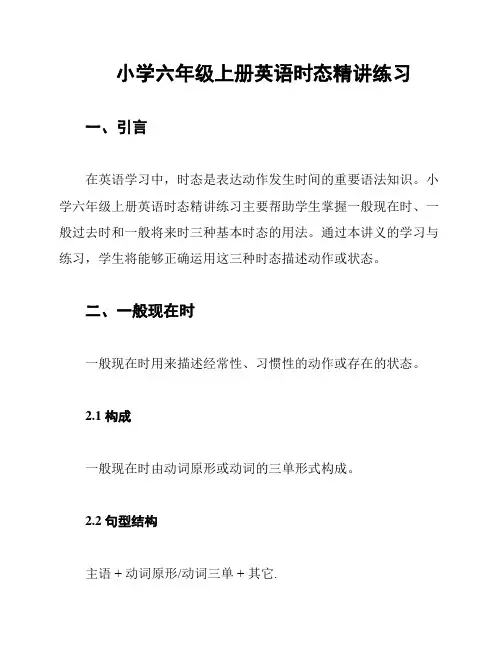
小学六年级上册英语时态精讲练习一、引言在英语学习中,时态是表达动作发生时间的重要语法知识。
小学六年级上册英语时态精讲练习主要帮助学生掌握一般现在时、一般过去时和一般将来时三种基本时态的用法。
通过本讲义的学习与练习,学生将能够正确运用这三种时态描述动作或状态。
二、一般现在时一般现在时用来描述经常性、习惯性的动作或存在的状态。
2.1 构成一般现在时由动词原形或动词的三单形式构成。
2.2 句型结构主语 + 动词原形/动词三单 + 其它.2.3 练习1. I (eat)_____ breakfast every morning.2. She (go)_____ to school by bus.3. The cat (sleep)_____ on the sofa.三、一般过去时一般过去时用来描述过去发生的动作或存在的状态。
3.1 构成一般过去时由动词的过去式构成。
3.2 句型结构主语 + 动词过去式 + 其它.3.3 练习1. I (watch)_____ a movie yesterday.2. She (visit)_____ her grandparents last week.3. They (play)_____ soccer in the park.四、一般将来时一般将来时用来描述将来要发生的动作或存在的状态。
4.1 构成一般将来时有两种构成方式:will + 动词原形和 be going to + 动词原形。
4.2 句型结构1. 主语 + will + 动词原形 + 其它.2. 主语 + be going to + 动词原形 + 其它.4.3 练习1. I (buy)_____ a new bike next month.2. She (travel)_____ to Japan with her family.3. They (move)_____ to a new house in two years.五、总结通过本讲义的学习与练习,学生应掌握一般现在时、一般过去时和一般将来时三种基本时态的构成、句型结构和用法。
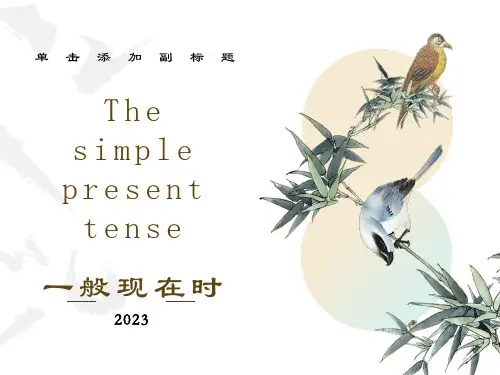
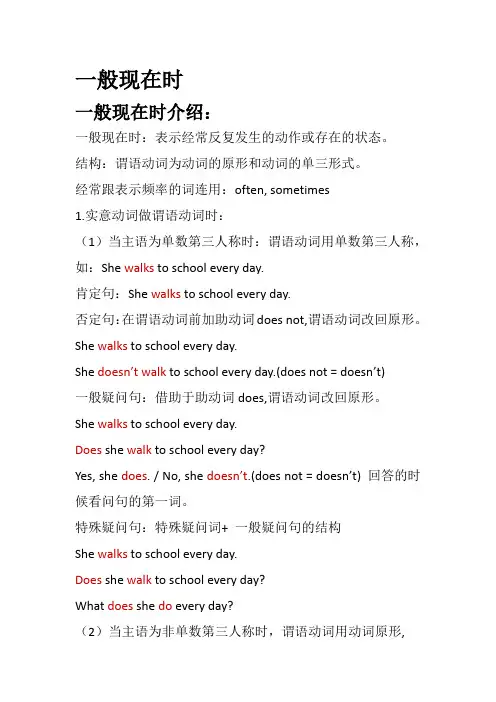
一般现在时一般现在时介绍:一般现在时:表示经常反复发生的动作或存在的状态。
结构:谓语动词为动词的原形和动词的单三形式。
经常跟表示频率的词连用:often, sometimes1.实意动词做谓语动词时:(1)当主语为单数第三人称时:谓语动词用单数第三人称,如:She walks to school every day.肯定句:She walks to school every day.否定句:在谓语动词前加助动词does not,谓语动词改回原形。
She walks to school every day.She doesn’t walk to school every day.(does not = doesn’t)一般疑问句:借助于助动词does,谓语动词改回原形。
She walks to school every day.Does she walk to school every day?Yes, she does. / No, she doesn’t.(does not = doesn’t) 回答的时候看问句的第一词。
特殊疑问句:特殊疑问词+ 一般疑问句的结构She walks to school every day.Does she walk to school every day?What does she do every day?(2)当主语为非单数第三人称时,谓语动词用动词原形,如:I often play football .肯定句:I often play football .否定句:在谓语动词前加助动词do not,谓语动词改回原形。
I don’t play football.(do not = don’t)一般疑问句:借助于助动词do,谓语动词还用原形。
Do you play football?Yes, I do. / No, I don’t .(do not = don’t) 回答的时候看问句的第一词。
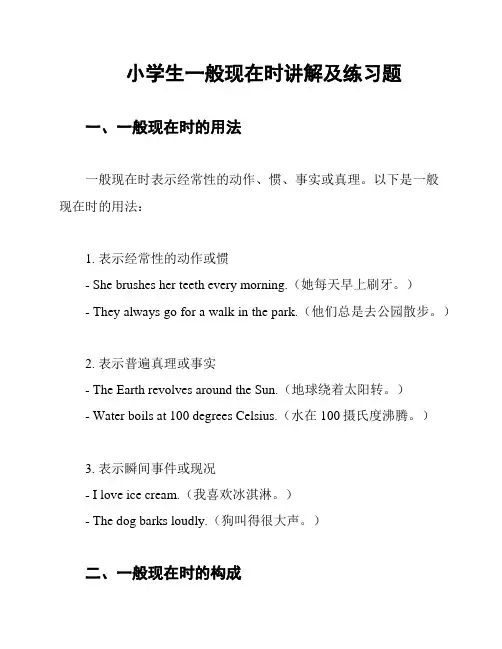
小学生一般现在时讲解及练习题一、一般现在时的用法一般现在时表示经常性的动作、惯、事实或真理。
以下是一般现在时的用法:1. 表示经常性的动作或惯- She brushes her teeth every morning.(她每天早上刷牙。
)- They always go for a walk in the park.(他们总是去公园散步。
)2. 表示普遍真理或事实- The Earth revolves around the Sun.(地球绕着太阳转。
)- Water boils at 100 degrees Celsius.(水在100摄氏度沸腾。
)3. 表示瞬间事件或现况- I love ice cream.(我喜欢冰淇淋。
)- The dog barks loudly.(狗叫得很大声。
)二、一般现在时的构成在一般现在时中,动词的变化相对简单。
1. 对于第三人称单数(He/She/It),动词要加-s或-es。
- He walks to school every day.(他每天走路去学校。
)- She eats an apple.(她吃一个苹果。
)- It runs fast.(它跑得很快。
)2. 对于其他人称(I/You/We/They),动词不变。
- I play soccer on weekends.(我周末踢足球。
)- You read books every night.(你每晚读书。
)- We go swimming in summer.(我们夏天去游泳。
)- They watch movies together.(他们一起看电影。
)三、练题请根据句意填入正确的动词形式。
1. My mother __________ (cook) dinner for us every evening.2. Tom and Lisa __________ (play) tennis on Saturdays.3. The sun __________ (rise) in the east.4. We __________ (study) English at school.5. Dogs __________ (bark) when they see strangers.1. cooks2. play3. rises4. study5. bark希望以上讲解和练习题对你有帮助!。
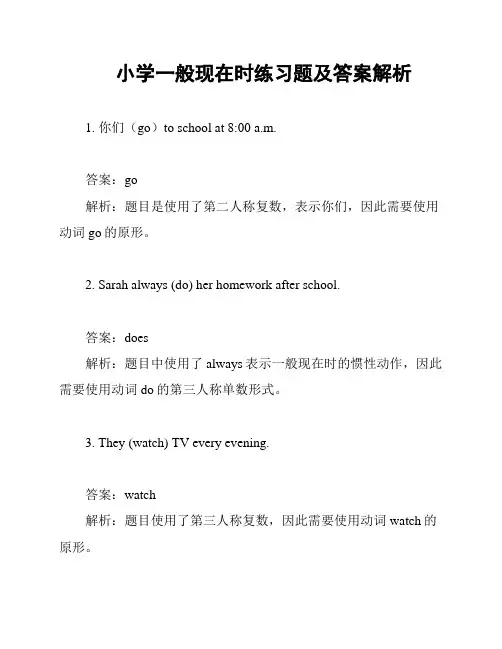
小学一般现在时练习题及答案解析1. 你们(go)to school at 8:00 a.m.答案:go解析:题目是使用了第二人称复数,表示你们,因此需要使用动词go的原形。
2. Sarah always (do) her homework after school.答案:does解析:题目中使用了always表示一般现在时的惯性动作,因此需要使用动词do的第三人称单数形式。
3. They (watch) TV every evening.答案:watch解析:题目使用了第三人称复数,因此需要使用动词watch的原形。
4. We (play) soccer on Saturdays.答案:play解析:题目使用了第一人称复数,因此需要使用动词play的原形。
5. My sister (study) Chinese at school.答案:studies解析:题目使用了第三人称单数,因此需要使用动词study的第三人称单数形式。
6. Tom and Jerry (like) to eat pizza.答案:like解析:题目使用了第三人称复数,因此需要使用动词like的原形。
7. I (watch) movies on weekends.答案:watch解析:题目使用了第一人称单数,因此需要使用动词watch的原形。
8. The birds (fly) in the sky.答案:fly解析:题目使用了第三人称复数,因此需要使用动词fly的原形。
9. He (play) basketball after school.答案:plays解析:题目使用了第三人称单数,因此需要使用动词play的第三人称单数形式。
10. We (get up) at 6:30 a.m. every day.答案:get up解析:题目使用了第一人称复数,因此需要使用动词get up的原形。
以上是小学一般现在时练习题及答案解析。
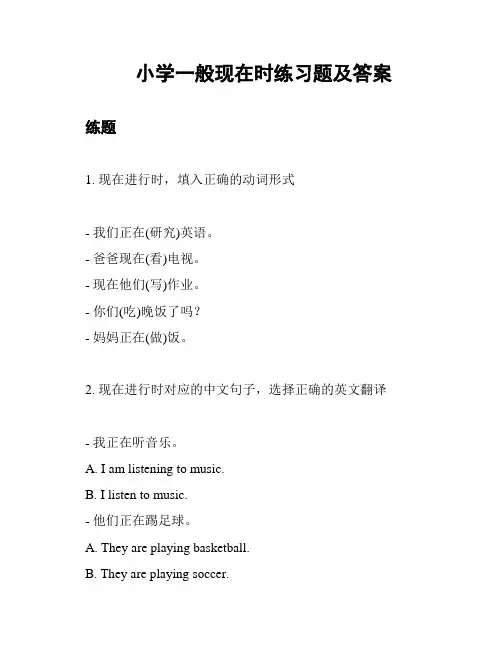
小学一般现在时练习题及答案练题1. 现在进行时,填入正确的动词形式- 我们正在(研究)英语。
- 爸爸现在(看)电视。
- 现在他们(写)作业。
- 你们(吃)晚饭了吗?- 妈妈正在(做)饭。
2. 现在进行时对应的中文句子,选择正确的英文翻译- 我正在听音乐。
A. I am listening to music.B. I listen to music.- 他们正在踢足球。
A. They are playing basketball.B. They are playing soccer.- 她正在写信。
A. She is writing a letter.B. She writes a letter.- 我们正在看电影。
A. We are watching TV.B. We are watching a movie.- 你正在打电话。
A. You are making a phone call.B. You receive a phone call.3. 现在进行时填入be动词的正确形式- 你们正在干什么?我们正(等)你们。
- 他们不在家,他们正在(散步)- 我们不想打扰她,因为她正在(睡觉)。
- 妈妈现在(做)饭。
答案1.- 我们正在研究英语。
学习英语。
- 爸爸现在看电视。
看电视。
- 现在他们写作业。
写作业。
- 吃晚饭了吗?吃晚饭了吗?- 妈妈正在做饭。
做饭。
2.- A. 我正在听音乐。
- B. 他们正在踢足球。
- A. 她正在写信。
- B. 我们正在看电影。
- A. 你正在打电话。
3.- 你们正在干什么?我们正在等你们。
在等你们。
- 他们不在家,他们正在散步。
散步。
- 我们不想打扰她,因为她正在睡觉。
睡觉。
- 妈妈现在在做饭。
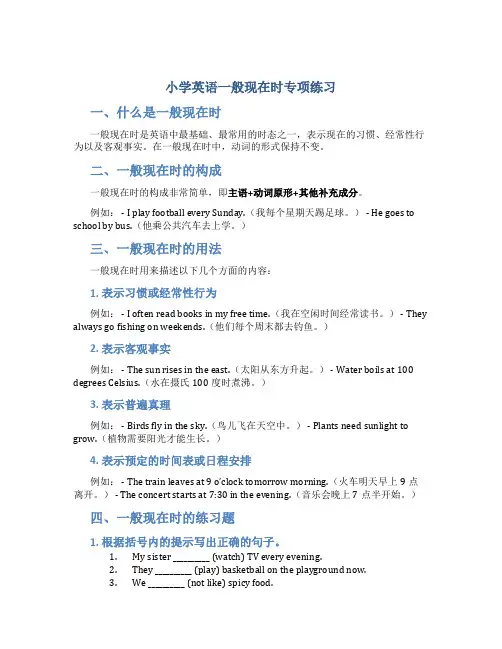
小学英语一般现在时专项练习一、什么是一般现在时一般现在时是英语中最基础、最常用的时态之一,表示现在的习惯、经常性行为以及客观事实。
在一般现在时中,动词的形式保持不变。
二、一般现在时的构成一般现在时的构成非常简单,即主语+动词原形+其他补充成分。
例如: - I play football every Sunday.(我每个星期天踢足球。
) - He goes to school by bus.(他乘公共汽车去上学。
)三、一般现在时的用法一般现在时用来描述以下几个方面的内容:1. 表示习惯或经常性行为例如: - I often read books in my free time.(我在空闲时间经常读书。
) - They always go fishing on weekends.(他们每个周末都去钓鱼。
)2. 表示客观事实例如: - The sun rises in the east.(太阳从东方升起。
) - Water boils at 100 degrees Celsius.(水在摄氏100度时煮沸。
)3. 表示普遍真理例如: - Birds fly in the sky.(鸟儿飞在天空中。
) - Plants need sunlight to grow.(植物需要阳光才能生长。
)4. 表示预定的时间表或日程安排例如: - The train leaves at 9 o’clock tomorrow morning.(火车明天早上9点离开。
) - The concert starts at 7:30 in the evening.(音乐会晚上7点半开始。
)四、一般现在时的练习题1. 根据括号内的提示写出正确的句子。
1.My sister __________ (watch) TV every evening.2.They __________ (play) basketball on the playground now.3.We __________ (not like) spicy food.4.The dog __________ (bark) loudly at strangers.5.She __________ (do) her homework after school every day. 2. 选择适当的词填空,完成下列句子。
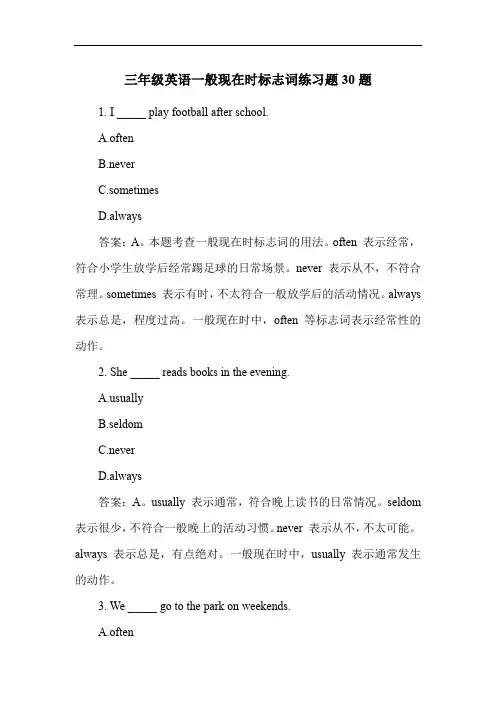
三年级英语一般现在时标志词练习题30题1. I _____ play football after school.A.oftenB.neverC.sometimesD.always答案:A。
本题考查一般现在时标志词的用法。
often 表示经常,符合小学生放学后经常踢足球的日常场景。
never 表示从不,不符合常理。
sometimes 表示有时,不太符合一般放学后的活动情况。
always 表示总是,程度过高。
一般现在时中,often 等标志词表示经常性的动作。
2. She _____ reads books in the evening.uallyB.seldomC.neverD.always答案:A。
usually 表示通常,符合晚上读书的日常情况。
seldom 表示很少,不符合一般晚上的活动习惯。
never 表示从不,不太可能。
always 表示总是,有点绝对。
一般现在时中,usually 表示通常发生的动作。
3. We _____ go to the park on weekends.A.oftenB.seldomC.neverD.always答案:A。
often 表示经常,周末去公园比较符合实际。
seldom 表示很少,不太符合周末的活动情况。
never 表示从不,不太可能。
always 表示总是,有点绝对。
一般现在时中,often 表示经常性的动作。
4. He _____ watches TV after dinner.uallyB.seldomC.neverD.always答案:A。
usually 表示通常,晚饭后看电视比较常见。
seldom 表示很少,不太符合一般情况。
never 表示从不,不太可能。
always 表示总是,有点绝对。
一般现在时中,usually 表示通常发生的动作。
5. They _____ play games in the classroom.A.sometimesB.neverC.oftenD.always答案:A。
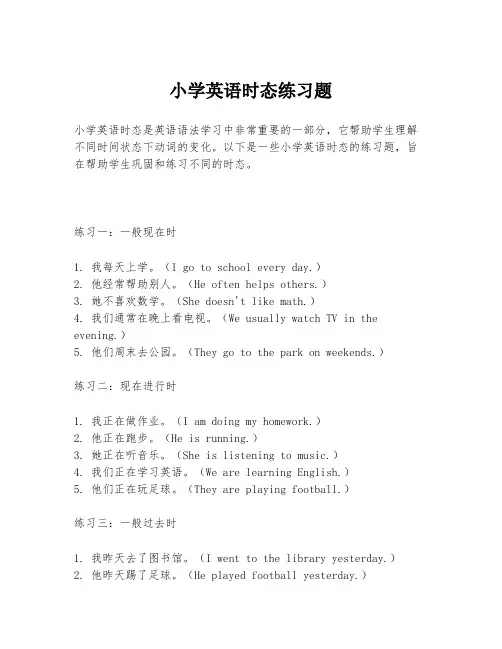
小学英语时态练习题小学英语时态是英语语法学习中非常重要的一部分,它帮助学生理解不同时间状态下动词的变化。
以下是一些小学英语时态的练习题,旨在帮助学生巩固和练习不同的时态。
练习一:一般现在时1. 我每天上学。
(I go to school every day.)2. 他经常帮助别人。
(He often helps others.)3. 她不喜欢数学。
(She doesn't like math.)4. 我们通常在晚上看电视。
(We usually watch TV in the evening.)5. 他们周末去公园。
(They go to the park on weekends.)练习二:现在进行时1. 我正在做作业。
(I am doing my homework.)2. 他正在跑步。
(He is running.)3. 她正在听音乐。
(She is listening to music.)4. 我们正在学习英语。
(We are learning English.)5. 他们正在玩足球。
(They are playing football.)练习三:一般过去时1. 我昨天去了图书馆。
(I went to the library yesterday.)2. 他昨天踢了足球。
(He played football yesterday.)3. 她昨天看了电影。
(She watched a movie yesterday.)4. 我们昨天去了动物园。
(We went to the zoo yesterday.)5. 他们昨天看了一场音乐会。
(They watched a concert yesterday.)练习四:一般将来时1. 我明天会去购物。
(I will go shopping tomorrow.)2. 他明天要参加一个生日派对。
(He is going to attend abirthday party tomorrow.)3. 她明天会去图书馆。
英语一般现在时全面讲解附练习及答案概念1.表示经常性或习惯性的动作,常与表示频度的时间状语连用。
如:al ways, usually, often, sometimes, seldom(很少), never(决不), every day, at 8:30, on Sunday,in the morning等。
如:I always get up at 6:00 in the morning.2.表示现在时刻的状态、能力、性格、个性。
如:She loves English very much. My sister can play the piano very well.3.表示客观的事实。
如:The sun rises in the east. 太阳从东方升起。
4.格言或警句。
如:Pride goes before a fall. 骄者必败。
02句子结构1.如果句子主语的人称是I, we, you, they或复数名词时,动词用动词原形。
如:We often go home by bus.2.如果句子的主语是第三人称单数,即:he, she, it 或单数名词时,动词要用第三人称的单数形式。
如:He often goes home by bus03动词的第三人称单数构成规则1.一般情况下在动词的后面直接加“s”;如:work→works play→plays¬ rain→rains see→sees visit→visits2.以o, x,s,sh, ch结尾的动词,在后面加“es”;如:do→does fix→fixes guess→guesses wash→washes teach→teaches3.以辅音字母加y结尾的动词,先把“y”改为“i”, 再加“es”;如:fly→flies study→studies carry→carries4.不规则变化。
如:have→has04注意在一般现在时的句子中,如果前面使用了助动词does, doesn’t, will, won’t, can, can’t, would, wouldn’t, must, mustn’t 等,尽管主语是第三人称单数,后面的动词用动词原形。
小学六年级英语时态练习题及答案一、时态概念回顾在学习英语时态之前,我们首先需要了解时态的概念。
时态指的是动词表示的动作或状态发生的时间。
英语中常用的时态有以下几种:一般现在时、一般过去时和一般将来时。
在学习英语时态时,我们需要掌握每种时态的基本用法和表示的时间。
二、一般现在时练习题1. 选择正确的动词形式填空。
1.He ______ (go/goes) to school every day.2.My sister ______ (likes/like) playing basketball.3.They ______ (watch/watches) TV in the evening.4.The train ______ (arrive/arrives) at 6 o’clock.5.I ______ (play/plays) the piano on weekends.2. 根据句子的意思,选择正确的答案。
1.______ your parents work in a factory? (Does/Do)2.We ______ basketball after school. (plays/play)3.Tom ______ a sandwich for lunch. (eat/eats)4.______ your brother like swimming? (Does/Do)5.My teacher ______ English very well. (teach/teaches)答案:1.goes2.likes3.watch4.arrives5.play6.Do7.play8.eats9.Does10.teaches三、一般过去时练习题1. 选择动词的适当形式填空。
1.He ______ (go/went) to the park yesterday.2.They ______ (watch/watched) a movie last night.3.She ______ (visit/visited) her grandparents on the weekend.4.We ______ (play/played) football yesterday.5.The cat ______ (catch/caught) a mouse just now.2. 根据句子的意思,选择正确的答案。
小学英语一般现在时讲解及专项练习(附答案)时态是英语中一个重要的语法范畴,小学英语主要是如下的四大时态:一般现在时、现在进行时、一般过去时、一般将来时。
今天主要是小学英语时态重点讲解——一般现在时,附专项练习和答案!一般现在时主要描述经常会发生的动作、状态或不变的真理。
句末常出现every day/week/year/Monday , in the morning;句中常有always, usually, often, sometimesI am a student.He is tall.否定句:在be 后加notI am not a student.He is not tall.疑问句:be 动词提前到第一位。
Are you a student?Yes,I am./No,I am not.Is he tall?Yes,he is./No,he isn’t.We go to school on Monday.He goes to the park on Sunday.否定句:主语+don’t/doesn’t’t+动词原形+地点+时间We don’t go to school on Monday.He doesn’t go to the park on Sunday.疑问句:在句首加do或doesDo you go to school on Monday?Yes, we do./ No, we don’t.Does he go to the park on Sunday?Yes, he does./ No, he doesn’t.专项练习一、写出下列动词的第三人称单数形式。
eat read do take washwatch have carry study flycatch go have cook looksing teach like get come play二、用单词的正确形式填空:1.Mike ___________ (do) his homework every day.2.There ____________ (be) some water in the glass.3.We like ____________ (play) basketball after class.4.I like singing. I often ____________ (listen) to the music in the evening.5.My grandma ___________ (watch) TV every day.三、选择最佳的答案:1.____Alice often play the piano. No, she _____.A. Do; doB. Does; doesC. Does; doesn't2.___ your penfriend __ in Beijing?A. Do; liveB. Do; livesC. Does; live3.Tom and Mike __ very excited, they will take a trip.A.IsB. areC. am4.I like ________ very much.What about you?A. danceB. dancedC. dancing5.I can’t find my pen. Let me __.A. go and ask herB. go and ask hersC. go and ask she6.Fangfang is a good student. She ____maths.A. does good atB. well do itC. is good at7.The kite ____ a bird.A. look likeB. is lookingC. looks like8.Bill and I ___ good friends.A. isB. areC. am9.Sandy often ___ his homework on Sundays .A. doB. doesC. did10.What do you usually do on the weekend? I __________.A.went swimmingB. go swimmingC. visited grandparents10.What do you usually do on your holiday?A. saw elephantsB. sing and danceC.took picture11.I ____ a student. I go to school ____bus every day.A. is; byB. am; onC. am; by12.I ____ a brother. She ____ a sister.A. have; hasB. has; hasC. have; have13.You ____ a student. He ____ a teacher.A. is; isB. are; isC. are; are15. He always _____ football games.A. watchesB. watchC. doesn't16.My best friend _____ shells.A. collectsB. collectC. often17.She doesn’t _____ listening to the music.A. oftenB. likeC. likes18.My mother and I ___ always watch romantic films.A. doesn’tB. don’tC. do19.---When _____ he get home on Friday?----He gets home at four on Friday.A. doB. doesC. did专项练习题答案一、写出下列动词的第三人称单数形式。
一般现在时用法及讲解:一.一般现在时表示经常性、习惯性、永久性的动作。
代表一般现在时的时间状语:1、总是always2、通常usually3、经常often4、sometimes有时5、每年、每月、每日every year,every month, every day Eg. 我每天刷牙. I brush teeth every day.我经常早上跑步I often run in the morning.我通常每个周末去照顾奶奶。
I usually go to take care of my grandma every week.二.表示规律性、真理性规律性:every....,太阳从东方升起,从西方落下晚上月亮出现在,太阳出现在白天。
真理性:地球套着太阳转,月亮绕着地球转。
三.一般现在时的句子构成:有be动词:1.肯定句:主语+be动词+...2.否定句:主语+ be动词+ not + ...3.一般疑问句:be+主语+...?Eg. 他是小明. _______________我不是小明. ________________你是小明吗?_______________ 是的,我是_______没有be动词:1.肯定句: 主语+ 动词原形/单三+。
主语是______________时,后面动词用原形.主语是______________时,后面动词用单三.2.否定句:主语+______词+ not + 动词原形+ ...我通常不吃早饭I _____ ______ usually ____ breakfast.小明不喜欢吃早饭Xiaoming ____ _____ like having breakfast.3.一般疑问句:_______词+主语+动词_____+...助动词:____,当主语为第三人称单数时,do-_____.Eg. 1、小明喜欢吃冰激凌吗?______ xiaoming ____ eating ice cream?肯定回答:Yes, _____ _____.否定回答:No, _____ ______.2、小明和小芳吃冰激凌吗?____ xiaoming and xiaofang _____ ice cream?肯定回答:Yes,_____ ______ .否定回答:No , _____ ______ .难点:第三人称单数:he/she/it/称/名字(考点中的重点)Eg. 我的叔叔my uncle ,他的爸爸his father ....四.动词第三人称单数变化:1、一般情况下:动词+s例子:like +s ——likes listen+s listens2、动词末尾是_____字母+ “y”,去“___”变___+“___”.如果末尾字母的前一个单词是元音字母,直接+“s”(元音字母:a e i o u)Fly - _____ try-______ study-_____ carry-______3、动词末尾出现“o”“x”“sh”“ch”,+____.Eg.:Do—_____ go— _____ Fix—______Wash - ______ fish - ______ brush - ______Watch - _______ reach-______4、不规则变化have- _____翻译:1、他通常每天吃早饭。
一般现在时讲解及练习1.一般现在时:1.表示事物或人物的特征、状态..如:The sky is blue.天空是蓝色的..2.表示经常性或习惯性的动作..如:I get up at six every day.我每天六点起床..3.表示客观现实..如:The earth goes around the sun.地球绕着太阳转..2.构成:3. 1. be动词:主语+beam;is;are+其它..如:4. I am a boy.我是一个男孩..2.行为动词:主语+行为动词+其它..如:We study English.我们学习英语..当主语为第三人称单数he; she;it时;要在动词后加"-s"或"-es"..如:Mary likes Chinese.玛丽喜欢汉语..注意:一般现在时经常和频率副词连用..5.我的变化--否定句、一般疑问句、特殊疑问句:6. 1. be动词的变化..7.否定句:主语+ be + not +其它..8.如:He is not a worker.他不是工人..9.一般疑问句:Be +主语+其它..10.如:-Are you a student11.-Yes. I am. / No; I'm not.12.特殊疑问句:疑问词+一般疑问句..如:Where is my bike13.2.行为动词的变化..14.否定句:主语+ don't doesn't +动词原形+其它..如:15.I don't like bread.16.当主语为第三人称单数时;要用doesn't构成否定句..如:17.He doesn't often play.18.一般疑问句:Do Does +主语+动词原形+其它..如:19.- Do you often play football20.- Yes; I do. / No; I don't.21.当主语为第三人称单数时;要用does构成一般疑问句..如:22. - Does she go to work by bike23. - Yes; she does. / No; she doesn't.24.特殊疑问句:疑问词+一般疑问句..如:How does your father go to work动词第三人称单数形式构成规则动词原形变第三人称单数的规则与发音规律同名词单数变复数大致相同;请认真观察..1、大多数动词在词尾加“S”在清辅音后发音为s;在浊辅音及元音后发音为z..如:①stop-stops s make-makes s②read-reads z play-plays z2、以辅音字母加“y”结尾的;要先将“y”变为“i”;然后在加“es”读iz 如:fly-flies z carry-carries zstudy-studies z worry-worries3、以“s; x; ch; sh”结尾的;在词尾加“es”;发音为iz 如:teach-teaches iz watch-watches iz4、以“o”结尾的动词;加“es”;读z 如:go-goes z do-does z下面几个动词变为单数时;原词的元音部分的发音发生了较大的变化;请注意记忆.. 如:1、do du:-does dz2、say sei-says sez以不发音字母“e”结尾的开音节词;如果尾音是s;z时;加“s”后字母“e”发音; 与所加“s”一起读做iz.. 如: close-closes izbe动词包括:am; is; are..第三人称单数用 is;过去式为 was;复数are;过去式为were. have;遇到主语是第三人称单数时;要用 has;动词 be 的第三人称单一般现在时练习题(一)写出下列动词的第三人称单数形式:drink--___________ go-- _____________ stay-- ____________ make--___________ look--__________ carry--___________ come-- ___________ watch--___________ plant--____________ _fly --_____________ do--______________ sit--______________guess--_____________die--______________go--______________rush-- __________reach--_____________touch--_____________brush--____________fly-- _____________copy-- ____________say-- _____________run--______________do-- ______________fix-- _____________live--______________cry--______________enjoy--_____________have--_____________wish--_____________play--_____________teach-- ___________buy--_____________study-- ___________(二)用所给词的正确形式填空..1.What_____doAlice find2.Which toy_____do she like3.He doesn’t______knowher name.4.Where _____doGrandma live5.The boy_______chase it.6.Grandma Wang___live in Pudong.7.When ______dohe get up8.Kitty______watchTV everyday.9.John can’t_______find his watch.(三)选择题1.Jack and her mother _____happy.A.doesB.areC.isD. have2..Her mother ______the beanstalk.A.takeB.is take Ctakes D. taking3.The woman_______the beanstalk.A.cutB.cuttingC.are cutD.cuts4.The goose_______golden eggs.yysyedyes5.Supergirl and Superdog______them.A.savesB.saveC.savingD.is saving6.Ben_____a new bicycle.A.haveB.hasC.areD.were7. A man _____in front of his car.A.walkB.walksC.walkingD.work8.How _____it feelA.doesB.doC.areD.is9.-He came early this morning; didn't he10. -Yes; he did. He often___ to school early.11. A. come B. comes C. came D. has come12.Ann ____ her hair every week.13. A. is going to wash B. wash C. washes D. is washing14.They usually_____TV in the evening.15. A. watch B. will watch C. are watching D. watches16.The sun ___ in the east and___ in the west.17. A. raises; set B. rise; sets C. rises; sets D. rises; set18.-I usually have milk and bread for breakfast. What about you; Jim19. -So do I; but my sister ___.20. A. hasn't B. doesn't C. didn't D. won't21.She will go if it ___ tomorrow.22. A. isn't rain B. don't rain C. doesn't rain D. didn't rain23.These little boys___ playing football.24. A. are liking B. like C. likes D. were liking25.-___ he ___ to work on foot -Yes; he___.26. A. Do; go; do B. Does; go; doesC. Is; going; doesD. Does; go; is27.-_____ they often ___ these old men28. -Yes; they___.29. A. Do; help; are B.Are; helping; areC. Do; help; doD. Are; helped; are(四)变否定句..1. He wants a book._____________________________________________________________ _2. Jimmy washes hands before dinner._____________________________________________________________ _3. Lisa likes milk very much._____________________________________________________________ _4. They walk to school._____________________________________________________________ _5. Lingling and Dandan are 10 years old._____________________________________________________________ _(五)变一般疑问句并作肯定和否定回答..1.He wants a book.______________________________________________________________ _________________________________________________________________ ____________________________________________________________________2. Jimmy washes hands before dinner._______________________________________________________________ _________________________________________________________________ _________________________________________________________________ __3. I am Chinese._______________________________________________________________ _________________________________________________________________ _________________________________________________________________ __4. They walk to school._______________________________________________________________ _________________________________________________________________ _________________________________________________________________ __5. Lingling and Dandan are 10 years old._______________________________________________________________ _________________________________________________________________ _________________________________________________________________ __(六)划线提问..1. He wants a book.____________________________________________________________ _____2. Jimmy washes hands before dinner.____________________________________________________________ _____3. Lisa likes milk very much.____________________________________________________________ _____4. They walk to school on Monday.____________________________________________________________ _____5. Lingling and Dandan are 10 years old.____________________________________________________________ _____。
一般现在时自述1.一般现在时:1.表示事物或人物的特征、状态。
如:The sky is blue.天空是蓝色的。
2.表示经常性或习惯性的动作。
如:I get up at six every day.我每天六点起床。
3.表示客观现实。
如:The earth goes around the sun.地球绕着太阳转。
2.构成:1. be动词:主语+be(am,is,are)+其它。
如:I am a boy.我是一个男孩。
2.行为动词:主语+行为动词(+其它)。
如:We study English.我们学习英语。
当主语为第三人称单数(he, she,it)时,要在动词后加"-s"或"-es"。
如:Mary likes Chinese.玛丽喜欢汉语。
注意:一般现在时经常和频率副词连用。
3.我的变化--否定句、一般疑问句、特殊疑问句:1. be动词的变化。
否定句:主语+ be + not +其它。
如:He is not a worker.他不是工人。
一般疑问句:Be +主语+其它。
如:-Are you a student?-Yes. I am. / No, I'm not.特殊疑问句:疑问词+一般疑问句。
如:Where is my bike?2.行为动词的变化。
否定句:主语+ don't( doesn't ) +动词原形(+其它)。
如:I don't like bread.当主语为第三人称单数时,要用doesn't构成否定句。
如:He doesn't often play.一般疑问句:Do( Does ) +主语+动词原形+其它。
如:- Do you often play football?- Yes, I do. / No, I don't.当主语为第三人称单数时,要用does构成一般疑问句。
如:- Does she go to work by bike?- Yes, she does. / No, she doesn't.特殊疑问句:疑问词+一般疑问句。
如:How does your father go to work?动词第三人称单数形式构成规则动词原形变第三人称单数的规则与发音规律同名词单数变复数大致相同,请认真观察。
1、大多数动词在词尾加“S”在清辅音后发音为[s],在浊辅音及元音后发音为[z]。
如:①stop-stops [s] make-makes [s]②read-reads [z] play-plays [z]2、以辅音字母加“y”结尾的,要先将“y”变为“i”,然后在加“es”读[iz] 如:fly-flies [z] carry-carries [z]study-studies [z] worry-worries3、以“s, x, ch, sh”结尾的,在词尾加“es”,发音为[iz] 如:teach-teaches [iz] watch-watches [iz]4、以“o”结尾的动词,加“es”,读[z] 如:go-goes [z] do-does [z下面几个动词变为单数时,原词的元音部分的发音发生了较大的变化,请注意记忆。
如:1)、do [du:]-does [dz]2)、say [sei]-says [sez]以不发音字母“e”结尾的开音节词,如果尾音是[s],[z]时,加“s”后字母“e”发音,与所加“s”一起读做[iz]。
如:close-closes [iz]be动词包括:am,is,are。
第三人称单数用is;过去式为was;复数are,过去式为were.have,遇到主语是第三人称单数时,要用has;动词be 的第三人称单一般现在时练习题(一)写出下列动词的第三人称单数形式:drink--___________ go-- _____________ stay-- ____________ make--___________ look-- ___________ carry--___________ come-- ___________ watch--___________plant--_____________fly --_____________ do--______________sit--______________guess--_____________die--______________go--______________rush-- _____________reach--_____________touch--______________brush--____________fly-- ______________copy-- _____________say-- ______________run--______________do-- ______________fix-- ______________live--______________cry--______________ enjoy--_____________ have--_____________ wish--_____________play--_____________teach-- ____________buy--_____________study-- ___________(二)用所给词的正确形式填空。
1.What_____(do)Alice find?2.Which toy_____(do) she like?3.He doesn’t______(know)her name.4.Where _____(do)Grandma live?5.The boy_______(chase) it.6.Grandma Wang___(live) in Pudong.7.When ______(do)he get up?8.Kitty______(watch)TV everyday.9.John can’t_______(find) his watch.(三)选择题1.Jack and her mother _____happy.A.doesB.areC.isD. have2..Her mother ______the beanstalk.A.takeB.is take Ctakes D. taking3.The woman_______the beanstalk.A.cutB.cuttingC.are cutD.cuts4.The goose_______golden eggs.yysyedyes5.Supergirl and Superdog______them.A.savesB.saveC.savingD.is saving6.Ben_____a new bicycle.A.haveB.hasC.areD.were7. A man _____in front of his car.A.walkB.walksC.walkingD.work8.How _____it feel?A.doesB.doC.areD.is9.-He came early this morning, didn't he?-Yes, he did. He often___ to school early.A. comeB. comesC. cameD. has come10.Ann ____ her hair every week.A. is going to washB. washC. washesD. is washing11.They usually_____TV in the evening.A. watchB. will watchC. are watchingD. watches12.The sun ___ in the east and___ in the west.A. raises; setB. rise; setsC. rises; setsD. rises; set13.-I usually have milk and bread for breakfast. What about you, Jim?-So do I, but my sister ___.A. hasn'tB. doesn'tC. didn'tD. won't14.She will go if it ___ tomorrow.A. isn't rainB. don't rainC. doesn't rainD. didn't rain15.These little boys___ playing football.A. are likingB. likeC. likesD. were liking16.-___ he ___ to work on foot?-Yes, he___.A. Do; go; doB. Does; go; doesC. Is; going; doesD. Does; go; is17.-_____ they often ___ these old men?-Yes, they___.A. Do; help; areB.Are; helping; areC. Do; help; doD. Are; helped; are(四)变否定句。
1. He wants a book.______________________________________________________________2. Jimmy washes hands before dinner.______________________________________________________________3. Lisa likes milk very much.______________________________________________________________4. They walk to school.______________________________________________________________5. Lingling and Dandan are 10 years old.______________________________________________________________(五)变一般疑问句并作肯定和否定回答。